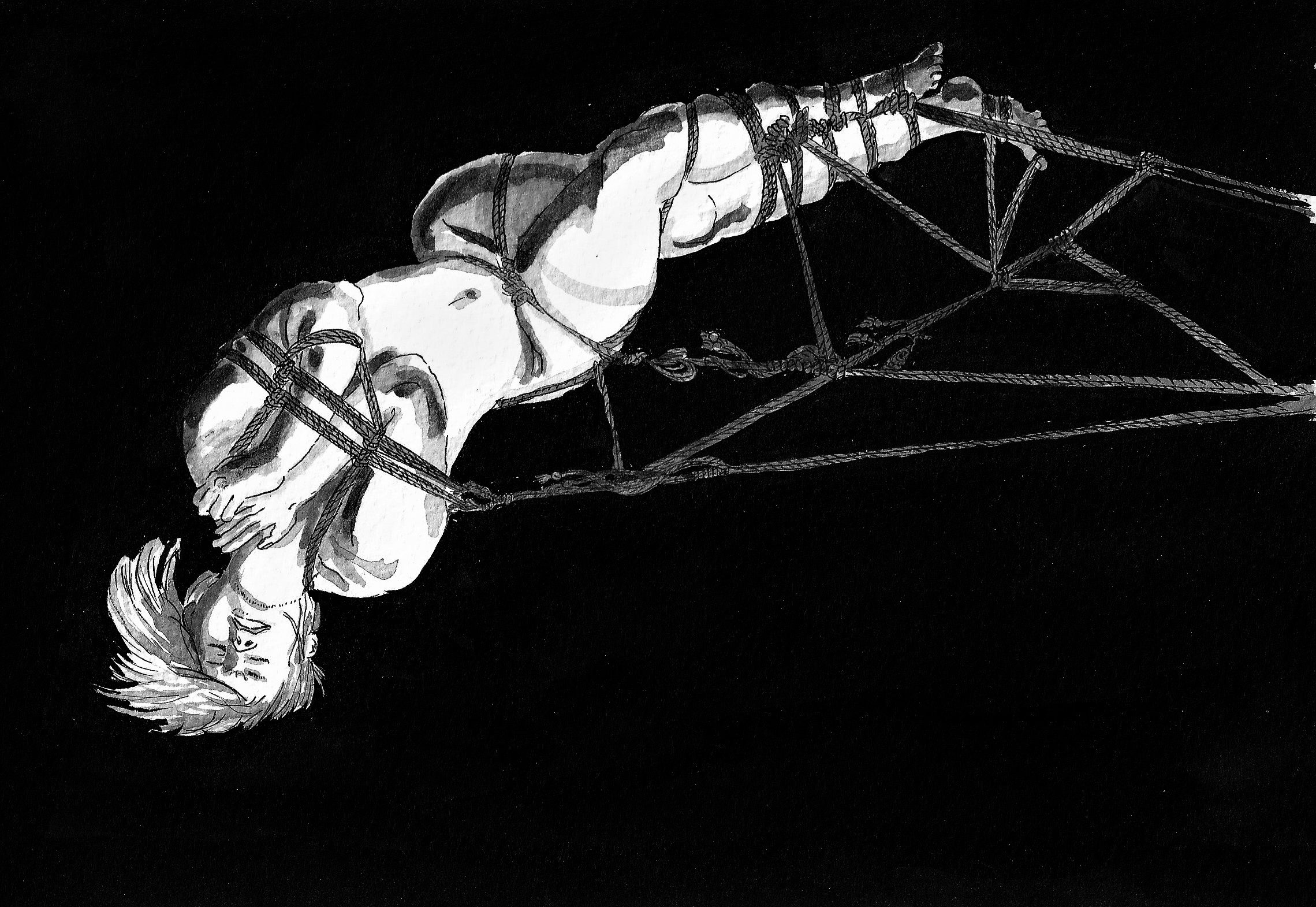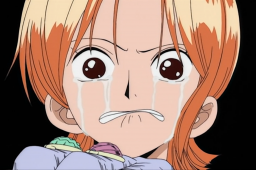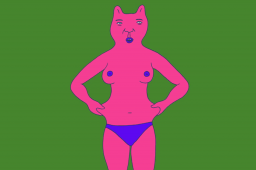
SHIBARI AND MENTAL HEALTH – A PERSONAL NOTE
- November 07, 2020
- by
- Aadmin
I have always struggled with anxiety, fear of failure and fear of commitment. I could discuss how these damaging mechanisms have a negative impact on almost every aspect of my life for hours but that’s something I have done countless amounts of times without being able to solve anything. That’s the reason why I’ve decided to seek professional help and I’ll hopefully start therapy in a few months. I’m happy that I was able to get to know people I can talk to about these issues, especially because I used to isolate myself whenever I was in a bad emotional state and that lead me into a spiral of self-doubts and rejection.
So what role does Shibari play in all of this?
Let me start with how I’ve gotten into it. I stumbled upon the Japanese art of tying through documentaries and stunning pictures I’ve seen on social media sites like instagram. I immediately perceived it as something really aesthetic but also as something exciting, something I want to experience for myself – and I did. I was tied three times, twice as a sort of preparation for the photoshoot and the third time for the photoshoot. The last time was probably the most intense and inspiring but also the most overwhelming of them all. I thought I knew what to expect and I did but the intensity and the level on which I was carried away by the session was unexpected. It got intimate really quickly and for the first time I’ve made the experience that being tied can make me feel very intoxicated. It took me a while to get a clear mind again and once I did, the experience almost felt surreal. Suddenly I was sensing the contrast between my tired, sober self and my devoted suffering ‘bunny self’* that was high on adrenaline and flooded with sensory overload and just a bundle of smiles and moans and the desire for more of whatever this was.
It was funny because in a way it was really confusing. I did not expect to not only get so vulnerable but to be excited and aroused by the actions of someone I did not particularily find attractive but that’s the magic of it. Fulfilling fantasies, the act of being tied skilfully and emotionally and closeness played such significant roles and had such a great impact on me that the person themself was not the focus anymore. The way how I perceived the person or rather which factors became important in perceiving something as attractive, suddenly shifted. The experience was definitely a pleasant one but as I said, also a really emotionally overwhelming one, especially because we took big steps in a short amount of time. I guess this concept was something I needed to internalize over time to fully comprehend. I decided to get to know new people and potential tying partners and I’m happy that I’ve continued doing that because I’ve found someone who I’m currently making amazing experiences with – but back to mental health: Practicing Shibari helps me in a lot of ways and I would like to explain how.
1. Know Thyself
Practicing Shibari enables me to discover my physical and emotional needs. I perceive my body clearer and I’m focussed on what exact sensations create which feelings. It makes me curious to test out my limits and it’s always interesting to see how different sensations feel different depending on my mental and physical state. It makes me want to find out what I need. If I want to be tied soft and emotional or rough, how my need for safety and feeling comfortable contrasts the need to feel completely helpless and exposed, how my body and voice react to which actions and how distorted I can perceive time and space. Those and many more are aspects that I don’t only find intriguing but which also reveal a lot about myself that I haven’t discovered yet and which make me feel more connected to myself.
2. Communication Skills
Shibari and any other kind of BDSM practice require the ability to communicate your own needs but also and especially your limits and dislikes. As someone who often struggles with feeling anxious about the expectations and judgements of others, I see this as an exercise. Communicating with people I trust definitely makes it easier but trust is gained over time. Continuously being in a situation in which I verbalize my feelings on my needs and limits makes me more confident in expressing those thoughts but also in expressing my thoughts on other subjects.
3. Allowing Closeness
I struggle with being close to people which probably seems to be ironic because I don’t tend to have no issues to engage in really intimate acts with people I just got to know. Usually the case is that I’m able to allow closeness for a certain amount of time, just until my anxiety kicks in and my safety mechanism leads me to isolate myself from said person. This could happen either in situations in which I happened to be physically or emotionally close to someone. When it comes to Shibari and I’m tying with someone of who I know will respects my limits, usually I can relax easily. In that situation I don’t feel pressured or as if I have to fulfil any kind of expectations. I’m able to enjoy the ropes and being close to the person who is tying me. I believe that being able to allow such closeness and feeling accepted and cared for creates positive associations, not only with being tied but with being in a situation in which I can make myself feel vulnerable (which always has and still is) one of my biggest issues.
4. Feeling accepted and Emotionally Balanced
Feeling accepted is linked to the former aspect because I’ve realized in various situations that only by making yourself vulnerable, you can be accepted and appreciated by others for who you are. I’ve always been really adaptive when it comes to interacting with other people, especially if I know that said people would judge me for my views, experiences or decisions. I’ve been working on that and it’s gotten better over time but I still haven’t reached a point yet at which I can confidently express myself all the time. The experience of being tied, of being the center of someone’s attention, of being involved in a beautiful and intense conversation is what makes it so fulfilling.
Aftercare* is an important and really amazing part of the whole experience. I usually cuddle with the person who tied me and just enjoy the moment while calming down. Afterwards I often feel tired but also really content, it’s similiar to feeling high but in contrast to this fleeting feeling of euphoria caused by the sensations and the mix of several hormones that were distributed by the session, there’s another heartwarming feeling, one that stays: the all encompassing feeling of being accepted – and I love that this makes me feel more emotionally balanced and confident and happy.
I’m really happy to have stumbled into the scene and (even though the pandemic has its challenges) that I was able to get to know a bunch of really nice people in a short amount of time. I’m currently tying with someone I’m content with and I can’t wait to learn more, to make more experiences and to go through all of the benefits this beautiful art entails.
Just explaining some terms
With ‘bunny self’ I refered to ‘rope bunny’ which is a term to describe the passive part in a Shibari session.
‘Aftercare’ is the time after a session in which the people involved offer each other physical comfort and emotional support. This is an essential part of the act because aftereffects of a long and intense session can range from a slight feeling of discomfort to anxiety and emotional outbursts. This is usually caused by the intense drop in adrenaline and endorphines. Taking time to calm down and being really attentive towards each others needs can make aftercare a beautiful and satisfying experience.
art by ‘jimbobvendredi’ (instagram and twitter)





